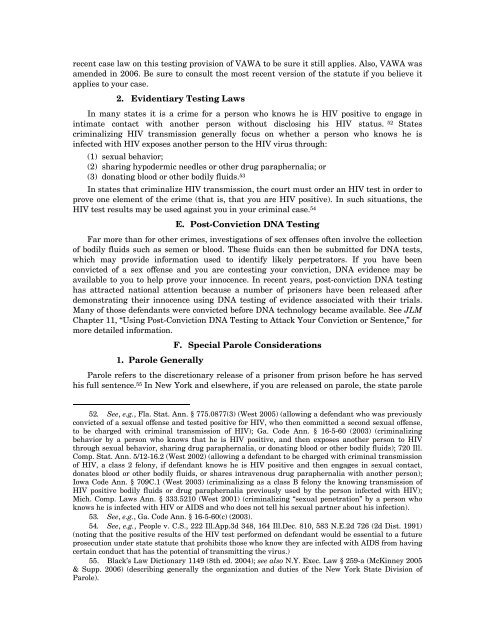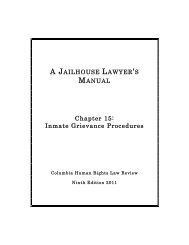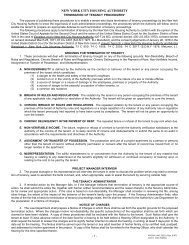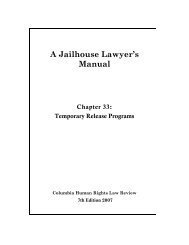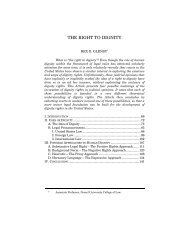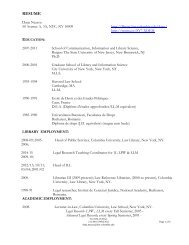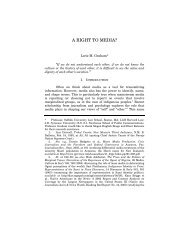Special considerations for sex offenders - Columbia Law School
Special considerations for sex offenders - Columbia Law School
Special considerations for sex offenders - Columbia Law School
Create successful ePaper yourself
Turn your PDF publications into a flip-book with our unique Google optimized e-Paper software.
ecent case law on this testing provision of VAWA to be sure it still applies. Also, VAWA wasamended in 2006. Be sure to consult the most recent version of the statute if you believe itapplies to your case.2. Evidentiary Testing <strong>Law</strong>sIn many states it is a crime <strong>for</strong> a person who knows he is HIV positive to engage inintimate contact with another person without disclosing his HIV status. 52 Statescriminalizing HIV transmission generally focus on whether a person who knows he isinfected with HIV exposes another person to the HIV virus through:(1) <strong>sex</strong>ual behavior;(2) sharing hypodermic needles or other drug paraphernalia; or(3) donating blood or other bodily fluids. 53In states that criminalize HIV transmission, the court must order an HIV test in order toprove one element of the crime (that is, that you are HIV positive). In such situations, theHIV test results may be used against you in your criminal case. 54E. Post-Conviction DNA TestingFar more than <strong>for</strong> other crimes, investigations of <strong>sex</strong> offenses often involve the collectionof bodily fluids such as semen or blood. These fluids can then be submitted <strong>for</strong> DNA tests,which may provide in<strong>for</strong>mation used to identify likely perpetrators. If you have beenconvicted of a <strong>sex</strong> offense and you are contesting your conviction, DNA evidence may beavailable to you to help prove your innocence. In recent years, post-conviction DNA testinghas attracted national attention because a number of prisoners have been released afterdemonstrating their innocence using DNA testing of evidence associated with their trials.Many of those defendants were convicted be<strong>for</strong>e DNA technology became available. See JLMChapter 11, “Using Post-Conviction DNA Testing to Attack Your Conviction or Sentence,” <strong>for</strong>more detailed in<strong>for</strong>mation.F. <strong>Special</strong> Parole Considerations1. Parole GenerallyParole refers to the discretionary release of a prisoner from prison be<strong>for</strong>e he has servedhis full sentence. 55 In New York and elsewhere, if you are released on parole, the state parole52. See, e.g., Fla. Stat. Ann. § 775.0877(3) (West 2005) (allowing a defendant who was previouslyconvicted of a <strong>sex</strong>ual offense and tested positive <strong>for</strong> HIV, who then committed a second <strong>sex</strong>ual offense,to be charged with criminal transmission of HIV); Ga. Code Ann. § 16-5-60 (2003) (criminalizingbehavior by a person who knows that he is HIV positive, and then exposes another person to HIVthrough <strong>sex</strong>ual behavior, sharing drug paraphernalia, or donating blood or other bodily fluids); 720 Ill.Comp. Stat. Ann. 5/12-16.2 (West 2002) (allowing a defendant to be charged with criminal transmissionof HIV, a class 2 felony, if defendant knows he is HIV positive and then engages in <strong>sex</strong>ual contact,donates blood or other bodily fluids, or shares intravenous drug paraphernalia with another person);Iowa Code Ann. § 709C.1 (West 2003) (criminalizing as a class B felony the knowing transmission ofHIV positive bodily fluids or drug paraphernalia previously used by the person infected with HIV);Mich. Comp. <strong>Law</strong>s Ann. § 333.5210 (West 2001) (criminalizing “<strong>sex</strong>ual penetration” by a person whoknows he is infected with HIV or AIDS and who does not tell his <strong>sex</strong>ual partner about his infection).53. See, e.g., Ga. Code Ann. § 16-5-60(c) (2003).54. See, e.g., People v. C.S., 222 Ill.App.3d 348, 164 Ill.Dec. 810, 583 N.E.2d 726 (2d Dist. 1991)(noting that the positive results of the HIV test per<strong>for</strong>med on defendant would be essential to a futureprosecution under state statute that prohibits those who know they are infected with AIDS from havingcertain conduct that has the potential of transmitting the virus.)55. Black’s <strong>Law</strong> Dictionary 1149 (8th ed. 2004); see also N.Y. Exec. <strong>Law</strong> § 259-a (McKinney 2005& Supp. 2006) (describing generally the organization and duties of the New York State Division ofParole).


